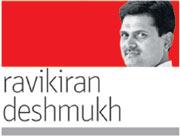Most of Mumbai’s inhabitants are well versed with Shiv Sena’s love-hate politics and the changes in its targets from time to time to further its agenda favouring the “sons of the soil”
 Most of Mumbai’s inhabitants are well versed with Shiv Sena’s love-hate politics and the changes in its targets from time to time to further its agenda favouring the “sons of the soil”.
Most of Mumbai’s inhabitants are well versed with Shiv Sena’s love-hate politics and the changes in its targets from time to time to further its agenda favouring the “sons of the soil”.
ADVERTISEMENT
Going by the rhetoric in Shiv Sena’s mouthpiece and its stinging comments against the Gujarati community, unbiased minds should understand that the definition of “sons of the soil” is amply clear and it doesn’t indicate any linguistic or religious bias, but only of origin.
As such, Marathis as well as Gujaratis are original residents of the city that is made of seven islands. Shiv Sena party chief Uddhav Thackeray has issued a clarification as a part of a damage control exercise. He has reminded people of the joint efforts by both the Marathis and Gujaratis to defeat the Congress to bring the NDA into power.
His predicament is clear; but he cannot make it open. The contents of the edit that appeared in Saamana are harsh and provocative, in the sense that Shiv Sainiks follow the ideology and comments propagated through the party mouth organ.
It’s not that no other Shiv Sena supporter or member except the party mouthpiece has reservations about the Gujaratis. They are not happy with the recent trend of construction of residential towers exclusively for
Gujaratis, where Marathis are not welcome because they are mostly non-vegetarians.
Sena members and supporters have reservations over the way Gujarati developers and businessmen have been taking over parts of Mumbai, particularly Girangaon (‘mill village’ in Marathi), the textile hub of Mumbai. They object to the way construction Czars from the Gujarati community are implementing the slum rehabilitation schemes or redevelopment projects. But, they cannot raise their voice because of the business interests of their party stalwarts.
For the sake of historical facts, one may differ that even during the British period, Mumbai, once known as India’s Manchester and a major commercial hub on the western coast of India, had a majority of Gujarati traders. The city was also the capital of the erstwhile Bombay state, comprising parts of Gujarat and Maharashtra.
In the year of 1960, a struggle by Marathis paid off and Maharashtra and Gujarat were carved out. It is a known fact that Shiv Sena was never averse to Gujaratis; the community has essentially been one of its major supporters. This was because of the Sena’s stand against south Indians and north Indians and a protective attitude towards Gujaratis, along with their business interests in textiles, building construction and trading.
It was the Shiv Sena that nominated two Gujaratis — Chandrika Kenia and Mukesh Patel — to the Rajya Sabha. Mumbaikars who follow the Sena closely are aware of how close Mukesh Patel was to the late Shiv Sena chief Bal Thackeray. Unlike other parties, Shiv Sena also had a special wing to pursue the cause of the Gujarati people.
At a time when rivals are pandering to Raj Thackeray’s Maharashtra Navnirman Sena – Shiv Sena’s archrival — the Shiv Sena cannot afford any polarisation among its support base, which has both Marathis and Gujaratis. The party may or may not like the BJP, but it has no alternative but to maintain its alliance in view of the NDA government appearing to be the most popular choice to taking over the reins at the Centre.
Shiv Sena desperately wants to be a part of the government; it has been out of power since 2004 at the Centre and since 1999 in the state. While the MNS is using the Marathi trump card, and a majority of Shiv Sainiks are looking up to Raj as their future leader, the Shiv Sena leadership will desperately look towards sharing power at the Centre, and will strive to change state-level equations to keep its ranks and files united.
Shiv Sena can’t afford to lose the Gujarati vote bank in Mumbai, which maintains the capacity to change the poll arithmetic. The only worry the Sena could possibly have is that the Gujaratis might open a new channel to communicate with the Centre directly, if Narendra Modi takes over as the new PM.
There is also a possibility that industries and businesses might shift to Gujarat, particularly to Surat and other parts of the state bordering Maharashtra. The diamond industry in Mumbai, with an approximate turnover of Rs 2.5 lakh crore, may also move to Surat. In that event, even the state government might lose a substantial amount of revenue.
The writer is Political Editor of mid-day
 Subscribe today by clicking the link and stay updated with the latest news!" Click here!
Subscribe today by clicking the link and stay updated with the latest news!" Click here!






